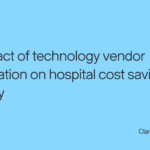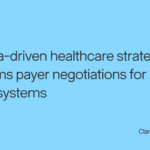Medicare is a pioneer in advancing value-based care, specifically its use of Accountable Care Organization (ACO) frameworks. Alternative Payment Models (APMs) are payment approaches that incentivize quality and value in healthcare delivery by rewarding providers for cost-efficient care and improved patient outcomes. Progressive APMs incentivize ACOs to deliver the best possible care, especially for patients with complex conditions that require multiple costly treatments—which describes the majority of Medicare recipients. This model is having a significant impact on the industry: For ACOs to function successfully, they need more specialists to help plan and deliver value-based care for patients with complex conditions that often require costly treatments. Yet engaging enough of them continues to be a challenge. Before the issue becomes critical, ACOs must take action to engage specialists to ensure the availability of high-quality care as the U.S. population ages. In this post, we explore some common obstacles that can prevent specialists from wanting to participate in this framework. Value-based care puts primary care physicians in the driver’s seat, relying on them to plan care. However, healthcare is facing a growing shortage of PCPs nationwide, expected to reach nearly 70,000 by 2036. In addition, for patients with complex conditions associated with high costs, such as end-stage renal disease and cancer, their care is often more effectively directed by specialists, who see them more frequently and have more insight into their overall health. Some specialists report that 90% of their patients do not have or do not see their PCP. However, most specialists still work under a fee-for-service model, making it difficult to incorporate them into a value-based framework: 50% of ACOs cited the dominance of this payment model as a major challenge. This points to a need to adapt financial structures to align with the clinical needs and realities of patients with complex conditions and an understanding of what value means in different healthcare situations. For patients with cancer, “value” could mean survival, which could require expensive treatments, or it could refer to a better quality of life. Defining “whole person care” in different clinical models can help ACOs design incentives for evidence-based practices in specialty areas and avoid unnecessary services and treatments from other providers. Care coordination between PCPs and specialists is another pain point. Incompatible EHR systems that hinder efficient information sharing and communication, heavy caseloads on both sides and a lack of support staff can discourage specialists from engaging with ACOs. Proactively designing and documenting roles and responsibilities more clearly in patient care management and standardizing processes and technologies can reduce confusion and delays. It can also ease the administrative burden. Specialists face significant obstacles when documenting compliance with quality metrics, care protocols, and evidence-based practices, navigating complex claim methods and reimbursement structures, and handling other office tasks. Investing in new technologies may help streamline processes and support more consistent and clear communication among providers and staff. Beyond these clinical and organizational issues, integrating specialty care into advanced primary care models and ACOs can present cultural challenges. Variations in treatment preferences and protocols and diverse communication styles and expectations can lead to misunderstandings or conflicts. The time and energy required to hammer out care protocols, communication processes, and other areas can be daunting. Yet seamless integration of specialist care is essential if ACOs are to continue offering high-quality, value-based care and improving patient outcomes. Increasing specialist engagement requires tactics that support collaboration and communication, align financial models, and reduce the administrative load. Supporting collaboration between PCPs and specialists starts with determining which should lead care. In ACOs, it is generally the PCP, but in patients with highly complex conditions, it can be more efficient for a specialist to take over. To identify when this is warranted, ACOs should develop evidence-based guidelines and pathways based on specific criteria. Clinicians can also use data analytics (including risk analysis based on historical and predictive analytics) to identify high-risk patients and populations that most benefit from specialist-directed care. When PCPs are in charge, they should have access to tools and resources to support whole-person care, including multidisciplinary care teams and technology-enabled solutions for specific concerns. ACOs must also develop financial frameworks to align incentives between payers and providers. In general, risk should be shifted to the provider managing the patient’s care. Quality-based payments and shared savings can make these adjustments more attractive to specialists. Data analytics can help clinicians track performance metrics and support enhanced physician accountability with real-time patient data. They can also ensure that financial incentives continue accurately rewarding high-quality, evidence-based care. Data analytics platforms can also help reduce the administrative burden on specialists by automating many repetitive administrative tasks via streamlined charting and documentation tools. This gives physicians more time with patients and promotes greater productivity and efficiency among staff members while aslo improving patient and provider satisfaction. The real-time data and insights these solutions provide can also minimize or eliminate the need to arrange follow-ups and meetings among the care team. These efficiencies can feed into improved patient health and satisfaction, leading to higher payments for positive outcomes and shared savings. Investing in care outreach can ensure a balance between primary and specialist care. Next-generation care models like care coordinators, telehealth services, remote patient monitoring, and integrating mental health care into primary care settings reduce the burden on PCPs while preventing issues that can require expensive specialist care. Predictive analytics can also help identify patients at high risk of complications or other issues from a PCP before their condition worsens. In other cases, a specialist should act early to prevent or slow the progression of certain conditions, such as chronic kidney disease, dementia, and multiple sclerosis. Data analytics platforms assess the results of tests and other input over time to identify patients who could benefit from early intervention. ACOs should develop criteria for incremental steps as part of clinical protocols and offer specific quality incentives to encourage specialists to provide these upstream services when they are needed. As the U.S. population ages and the healthcare industry moves toward a value-based model, specialist involvement in ACOs is critical to their success. Their expertise is required to manage patients with complex, high-cost conditions, ensuring that individuals receive high-quality care while benefiting from the ACO’s efficient use of resources. However, attracting specialists to ACOs has proven difficult due to differing financial models, administrative demands, and barriers to communication and care coordination. ACOs can address these obstacles by developing guidelines for collaborative care management, aligning financial incentives to reward high performance and positive outcomes, reducing the burden of paperwork, and facilitating proactive outreach and early specialist intervention when indicated. As value-based care models continue to make inroads, getting specialists on board is vital. Data analytics platforms can help ACOs implement these strategies by providing real-time insights, information, and tools that incorporate specialists’ concerns and needs.
Understanding the pain points in accountable care organizations
Strategies to increase specialist engagement in ACOs
Engaging specialists takes effort but brings rewards
- Author Details





